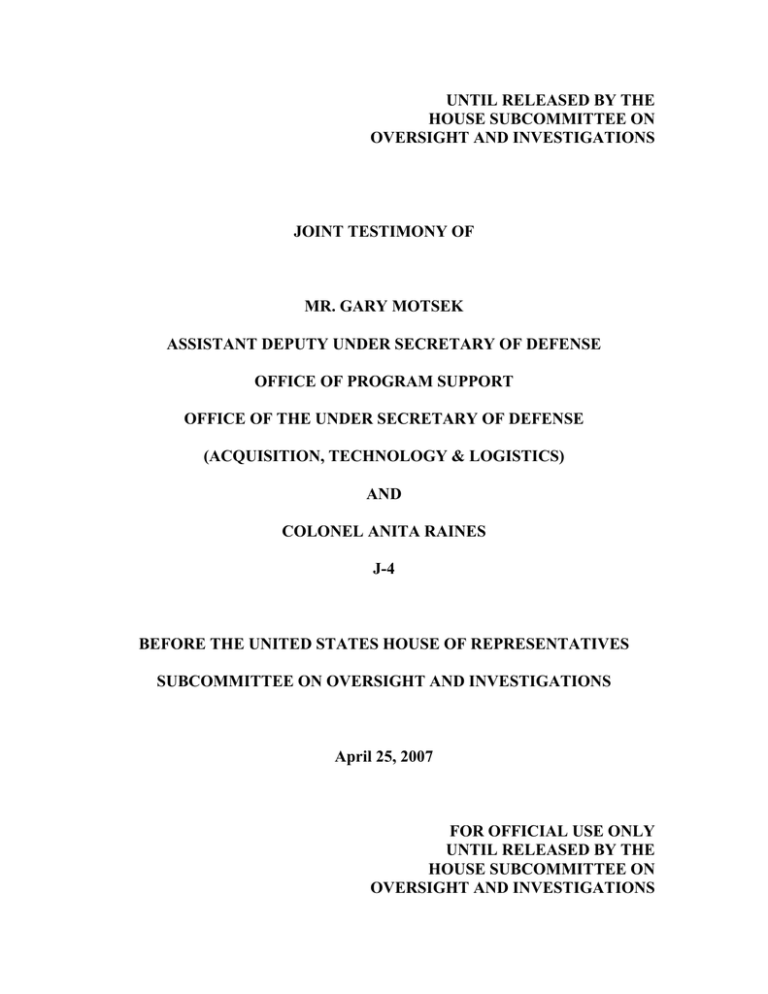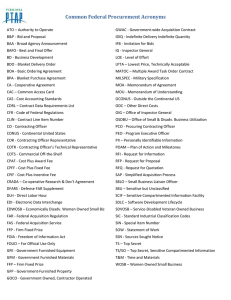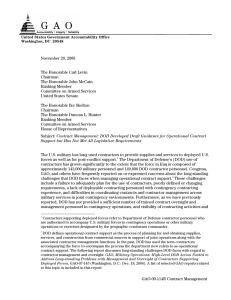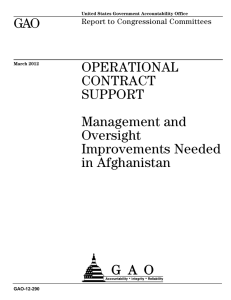UNTIL RELEASED BY THE HOUSE SUBCOMMITTEE ON OVERSIGHT AND INVESTIGATIONS
advertisement

UNTIL RELEASED BY THE HOUSE SUBCOMMITTEE ON OVERSIGHT AND INVESTIGATIONS JOINT TESTIMONY OF MR. GARY MOTSEK ASSISTANT DEPUTY UNDER SECRETARY OF DEFENSE OFFICE OF PROGRAM SUPPORT OFFICE OF THE UNDER SECRETARY OF DEFENSE (ACQUISITION, TECHNOLOGY & LOGISTICS) AND COLONEL ANITA RAINES J-4 BEFORE THE UNITED STATES HOUSE OF REPRESENTATIVES SUBCOMMITTEE ON OVERSIGHT AND INVESTIGATIONS April 25, 2007 FOR OFFICIAL USE ONLY UNTIL RELEASED BY THE HOUSE SUBCOMMITTEE ON OVERSIGHT AND INVESTIGATIONS Chairman Meehan, Ranking Member Akin, and Members of the Committee, thank you for the opportunity to appear before you today to discuss contracting issues relating to the Iraqi Security Forces. At the Department of Defense, we perform thousands of contract actions to support the State Department and the Multi-National Security Transition Command–Iraq (MNSTCI). All of our support contracts follow normal contracting processes and procedures, and we are fully committed to working with our agency partners on these contracts. We are pleased to join our colleagues from the State Department and the Department of Justice to share with you an overview of our contingency contracting efforts. We are currently incorporating the requirements set forth by Section 854 of the Fiscal Year 2007 National Defense Authorization Act into our new contingency contracting policies. We are implementing measures that institutionalize and enhance the oversight of contractor personnel and contractor operation. Since October 2006, we have established the Office of the Assistant Deputy Under Secretary of Defense for Program Support, established the Materiel Readiness Committee, are developing a Contingency Acquisition Support Office, and expanded Contingency Contracting training modules through the Defense Acquisition University as required by Section 854. We have also begun to improve controls with contracting through the use of automated systems tied to our common access cards. With these systems we have been able to establish a contractor personnel census. We were able to change DFARS to require the use of automated systems for contractor personnel accountability and contract linkage. We have been working closely with the House Armed Services Committee staff on our efforts to enhance oversight. We will continue to work side-by-side with them on this issue. In Operation Iraqi Freedom/Operation Enduring Freedom, we are relying heavily on contractors in combat operations. Through the experience we have gained over the past four years, we have many invaluable lessons learned that we are applying today. For example, we have established the Joint Contracting Command in Iraq. We have found the boots on the ground contracting command is critical to helping us meet our operational needs. This is just one lesson of many that is helping us improve our contingency contracting system. In closing, we believe that the overall contingency contracting process has been successful. The contracts have been compliant with the law, and considering the large volume of contracts and contract actions, there have been few problems. Contingency contracting is just a small piece of the much bigger picture in our area of responsibility and our lessons learned. We are fully committed to supporting the State Department, the other executive departments, and the MNSTC-I in their contracting efforts. We continue to make progress at the operational level with the State Department and the Department of Justice in this area. We acknowledge that in every situation there is room for improvement, and we are committed to improving our contracting oversight procedures and practices. We believe we have made advances in this area, and we will maintain our working relationship with the House Armed Services Committee and its subcommittees to keep them informed of our improvements to contingency contracting. We thank the Members of the Committee for their support. We would be happy to answer any questions you may have. Thank you.






